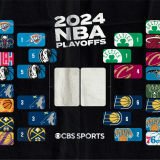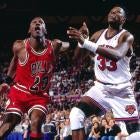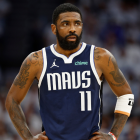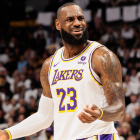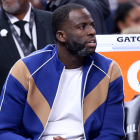With six NBA championships, 11 combined regular season and Finals MVP awards, 14 All-Star appearances and 10 scoring titles to his name, Michael Jordan has put together arguably the greatest career in NBA history. As is the case with everything in life, a series of major decisions shaped Jordan's career into what it became. Some of those decisions were made by Jordan himself, while others were out of his control.
Given how impactful Jordan's career was on the course of NBA history, it's an extremely interesting exercise to look back at certain major moments from that career and wonder what may have been had certain things gone down differently. Jordan was so good, and his impact on the history books so vast that a different outcome in any such scenario would have completely altered the course of league history.
With that said, here's a look at four of the biggest 'what ifs' from Jordan's playing days:
What if the Bulls didn't break up in 1998?
The Chicago Bulls' dynasty was going to end in 1998 no matter what. Jerry Krause was determined to move on from Phil Jackson as coach, and Michael Jordan was equally determined not to play for another coach. Krause also didn't want to keep Scottie Pippen around and pay him what he was worth on the open market. Thus, the Bulls disbanded following the 1997-98 season despite the fact that they had just won three straight NBA titles.
What would have happened had the Bulls stuck together for another season or two, even with a different coach, remains one of the biggest what ifs in league history. Jordan was no longer at his peak athletically when he walked away the second time in '97-98, but he was still the best player in the NBA as illustrated by the fact that he led the league in scoring during both the regular season and the postseason. Pippen still had gas left in the tank, too, as he continued to produce at a relatively high level for several more seasons in Houston and Portland. Had they remained together, the Bulls would have entered the 1998-99 season as the prohibitive favorite. Dennis Rodman even recently stated that the Bulls would have "easily" won a fourth straight NBA title in 1999 had they stayed together as a unit.
It's tough to disagree with Rodman. At the time, the Bulls were a step above the rest of their competition in the Eastern Conference, including the New York Knicks team that reached the Finals the year after the Bulls broke up. The upstart San Antonio Spurs, led by a young Tim Duncan and David Robinson, would have been a formidable test for Chicago in '99, but ultimately the Bulls gave us no reason to doubt their ability to win it all again. If they had, Jordan's legacy would loom larger than it already does, if that's possible.
What if two teams didn't pass on Jordan in the 1984 draft?
Michael Jordan's professional career started off with an enormous 'what if' moment. Over the course of his career, Jordan established himself as arguably the greatest basketball player of all time. Going back to draft night in 1984, however, two separate franchises passed up on the opportunity to select him. The Houston Rockets made Hakeem Olajuwon the No. 1 overall pick, and the Portland Trail Blazers took Sam Bowie with the second selection. Having hindsight, it's easy to say that Jordan should have been the top pick, but both teams had their reasons.
At that point in time, the game was played from the inside-out, which meant that there was a premium on big men, and the Rockets got a great one in Olajuwon. For as good as Jordan was, there's a reason why you don't often hear the Rockets being criticized for taking Hakeem -- because he was also great. Olajuwon led the Rockets to three Finals appearances and two titles, and established himself as one of the best players of all time in his own right. When the opportunity to draft a potentially dominant big man like Olajuwon presented itself as it did for Houston, you didn't pass it up.
Meanwhile, the Blazers had selected Clyde Drexler in the first round of the draft the previous year. Because Drexler possessed a skill set similar to Jordan's, the team felt that a Jordan selection would be redundant. So instead they opted to pick Bowie -- a big man -- in order to better balance out their roster. Things clearly worked out a bit better for Houston than they did for Portland, but they worked out best for the Chicago Bulls, who had Jordan fall into their lap at No. 3, and they raised six banners because of it.
But what if those two teams didn't pass over Jordan? What if the Rockets selected him first overall? They already had center Ralph Sampson, a Hall of Famer and four-time All-Star, on the roster. Perhaps Sampson and Jordan would have formed a dynamic inside-outside combination and led Houston to titles before injury issues started to mount for Sampson. Or what if the Blazers drafted Jordan to pair with Drexler. That's a duo that would have been talented enough to win titles for Portland.
Obviously, either of these divergent outcomes would have completely shifted the course of history for the Bulls, and the league at large. All things considered it's safe to say that as an organization the Bulls are probably pretty happy that things turned out the way they did.
What if Jordan accepted a full-time switch to point guard following the '88-89 season?
It's become just a footnote to what was an extremely eventful career, but for a stretch late in the 1988-89 season, Michael Jordan took over the point guard position for the Bulls. At that time, Jordan had become disillusioned with the lack of help that he was receiving on the offensive end of the floor, and he brought this up during an extended meeting with then-Bulls head coach Doug Collins. The outcome of the meeting was that Jordan would temporarily switch from his natural position of shooting guard to point guard. The switch would allow Jordan to help facilitate open offensive opportunities for his teammates by drawing a bulk of the defensive attention, while also allowing him to call his own number whenever he wanted by having the ball in his hands.
To say that Jordan was a quick learner at his new position would be an understatement. Consider this summary of Jordan's stint at the point guard spot from The Ringer:
The switch took the burgeoning legend's game to new heights. Jordan outdueled Magic Johnson one night, dishing 16 assists in a one-point win over the Lakers. The next, he went out in the second game of a back-to-back on the road and got the better of Phoenix's Kevin Johnson, putting up 32-10-9 in another one-point victory. Two nights later in Portland, he hung 34 points, a career-high 17 assists, seven rebounds, and six steals on the Trail Blazers in a commanding 15-point win that led Portland star Clyde Drexler to claim Jordan "handles the ball better than Magic." Not bad for a career 2-guard trying something different to push his team toward home-court advantage in Round 1.
In the 24 regular-season games that Jordan played at the point position that season, he averaged 30.4 points, 10.7 assists, and 9.2 rebounds per game. He recorded 12 triple-doubles (15 total on the season), and set a record with seven straight triple-doubles -- a record Russell Westbrook broke as a member of the Oklahoma City Thunder last season. The switch may have even helped Jordan become a better leader.
"The move has definitely helped us in many, many ways," Bulls general manager Jerry Krause said at the time. "It's gotten Michael into more of a leadership position, which we talked about with him for a long time. It's hard to lead when you're a [shooting] guard. When you're the [point] guard, leadership is easier."
Jordan played so well during his time at point guard that the Bulls considered keeping him there full time moving forward. Ultimately, though, Jordan felt that being Chicago's go-to guy and main facilitator was too much of a strain, and he wanted to return to his natural position. Considering the fact that the Bulls went on to win six titles with Jordan starting at shooting guard, it's safe to say that the decision was a sound one. However, it's fair to wonder what would have happened if Jordan had accepted a full-time switch to point guard, and how the arc of NBA history may have been altered. Would the Bulls have had the same success that they experienced with him at the two spot? Given the success he had at the position, he almost certainly would have redefined the position as it was known at the time, and in turn inspired other players with similar skill sets to potentially play point. Perhaps Kobe Bryant would have come into the league as a point guard, an event that would have had its own interesting ripple effect.
Ultimately, the Houston Rockets did something similar to the 1988-89 Bulls when they moved James Harden from shooting guard to point guard in 2016, although the league was much less position-oriented by then. Had Jordan stuck with the point position after the '88-89 season, we likely would have seen many more moves like that a lot sooner.
What if Jordan never retired in 1993 to pursue a baseball career?
Michael Jordan retired from the NBA at the peak of his powers in 1993 to take a break from basketball, and also pursue a baseball career. But what if he hadn't? This has been a popular question among NBA fans for decades, and two common trains of thought have developed. One is that Jordan and the Bulls would have continued their streak of dominance and won titles in 1994, 1995 and beyond -- potentially all the way through to '98 when Jordan walked away from the game for a second time. In turn, they would have prevented the Rockets from winning their two titles.
The other train of thought is that fatigue would have ultimately caught up with the Bulls at one point or another, if not during the 1993-94 season than during one of the following campaigns. As a result, perhaps Jordan and the Bulls only win four or five total titles and their dynasty ends earlier than '98. For what it's worth, former Bulls guard and current Warriors coach Steve Kerr says there's absolutely no way that the Bulls would have won eight straight titles if Jordan hadn't left to play baseball.
"Sometimes people say to me, 'If Michael had stayed, you guys would've won eight in a row.' That's the most preposterous thing I have ever heard," Kerr said in an interview with The Athletic earlier this year. "People have no idea how emotionally draining it is for a team to keep winning."
Kerr says because Jordan was able to get away from the pressure of the NBA for a while in order to refresh and recharge that he was able to come back and lead the Bulls to a second three-peat from 1996 to 1998, as Jordan was admittedly physically and mentally exhausted after Chicago's first three-peat.
"To me, the reason we won the second three was because he got away and recharged his batteries," Kerr said. "He needed it, desperately. And that's why he left. He was just burned out ... Bottom line was, he was fried. Going through a lot with his father's death. Just getting away for two years, recharged his batteries and got him ready for the next three."
It's also fair to wonder what if the Orlando Magic hadn't eliminated the Bulls in the 1995 postseason, Jordan's first since returning from baseball. It's extremely possible without that devastating loss burning into Jordan's heart, Chicago might not have had the proper fuel to accomplish its second three-peat.








